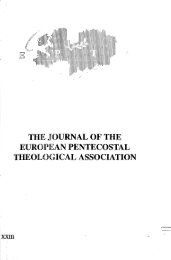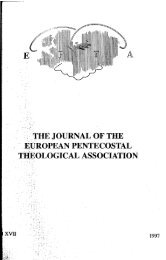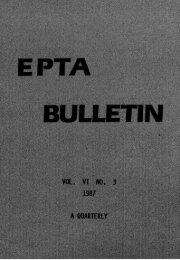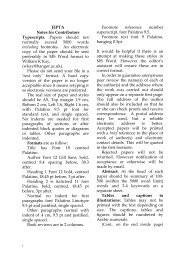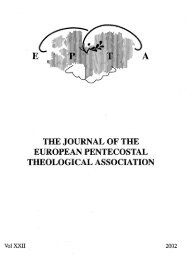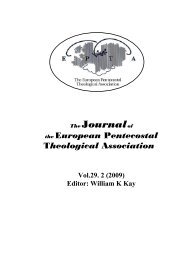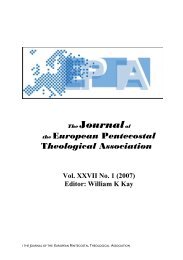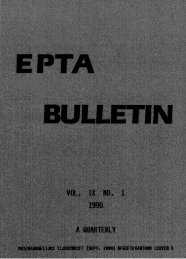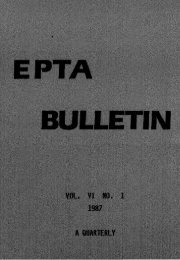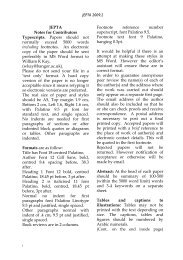jepta 2001 21 - European Pentecostal Theological Association
jepta 2001 21 - European Pentecostal Theological Association
jepta 2001 21 - European Pentecostal Theological Association
You also want an ePaper? Increase the reach of your titles
YUMPU automatically turns print PDFs into web optimized ePapers that Google loves.
The Journal of the <strong>European</strong> <strong>Pentecostal</strong> <strong>Theological</strong> <strong>Association</strong>, Vol. XXI, <strong>2001</strong><br />
The Place of the Church in the Economy of Salvation.<br />
Roman Catholic and <strong>Pentecostal</strong> Perspectives:<br />
Room for Rapprochement<br />
INTRODUCTION'<br />
Huibert Zegwaart<br />
It is common knowledge that the views of the Roman Catholic Church on<br />
ecclesiology and those current within the <strong>Pentecostal</strong> movement are widely at<br />
~ariance.~ Indeed, a mixture of the Presbyterian and Congregationalist models of<br />
the Church, which are in vogue in large sections of the <strong>Pentecostal</strong> Movement,<br />
may be regarded as the very antipode of the Episcopal model of Roman<br />
Catholicism. The focus of this paper will not be on ecclesiology as such, but on<br />
the relationship between ecclesiology and ~oteriology,~ as may be inferred from<br />
the title. Before getting into the topic, a word needs to be said about the<br />
derivation of the thesis and my own vantage point.<br />
During the 4th phase of the International Roman Catholic-<strong>Pentecostal</strong> ~ialope,'<br />
' Paper presented at the EPTA Conference, Bucharest, Romania, April <strong>2001</strong>.<br />
On terminology: The term '<strong>Pentecostal</strong> movement' is used in its narrower sense, excluding the<br />
so-called Neo-<strong>Pentecostal</strong>s, or Charismatics-within-the-historical-churches. That is to say, the<br />
term denotes the same group as is indicated by the expression 'Classical <strong>Pentecostal</strong> Churches'<br />
in the nomenclature of the International Roman Catholic-<strong>Pentecostal</strong> Dialogue.<br />
' It hardly needs pointing out that also in this respect the <strong>Pentecostal</strong> Movement is far from<br />
being homogenous. <strong>Pentecostal</strong>s of various kinds differ over virtually every aspect of the faith,<br />
save the belief that the biblical promise of the Baptism in the Spirit and charismatic gifts still<br />
constitute a living reality in the life of believers. Concerning models of church-organization,<br />
several are in use: many denominations that go under the name 'apostolic' veer towards the<br />
Episcopalian model, while the Assemblies of God-type are mostly Presbyterian with strong<br />
Congregationalist features.<br />
' Or in the terminology used by Kilian McDonnell, "The Pros and Cons of Dialogue with<br />
Roman Catholics", JPT 16 (2000), 90-101,9 1-92.<br />
' I consider myself a staunch supporter of this type of Dialogue with other Christian<br />
communities. Not only is it a way of working out the Lord's prayer "that all shall be one", but it<br />
may also help alleviate mounting tensions in those regions of the world where the growth of<br />
<strong>Pentecostal</strong> churches - as long as it still lasts - is easily perceived as a threat to those Christian<br />
bodies which are well established in that region. Thus, the strategic significance of these talks<br />
(removal of false stereotypes and misunderstandings) should not be underestimated. Moreover,<br />
both parties involved in these talks could benefit from the challenge that is posed by the<br />
different theological stance that is formulated 'from the other side of the table'. Especially<br />
<strong>Pentecostal</strong>s - who do not have a long-standing tradition of sustained theological reflection -<br />
could benefit from the stimulus provided by these talks.<br />
The Place of the Church in the Economy of Salvation. Roman Catholic and<br />
<strong>Pentecostal</strong> Perspectives: Room for Rapprochement Huibert Zegwaart<br />
I was an 'involved observer' at six of the eight venues.' In the first session I<br />
attended (in Rocca di Papa [Italy] in 1992), two paradigms of evangelization<br />
were discussed. One related to the <strong>Pentecostal</strong> Evangelization of Latin America,<br />
the other the Roman Catholic (re-)evangelization of Europe. Of the <strong>Pentecostal</strong><br />
Dialogue team, only one member was <strong>European</strong> (Miroslav Volf). Though<br />
officially an observer, I was graciously allowed to participate in the plenary<br />
discussions as if I were a full member of the <strong>Pentecostal</strong> team. In the years<br />
following, it occurred to me that the theological differences between the two<br />
parties in the area of ecclesioJogy were more profound than simply two opposing<br />
organizational models. In fact, they were more profound than simply two<br />
alternative views of what the Church is. At several points, it occurred to me that<br />
the difference touches the basic theological outlook of both partners in the<br />
Dialogue.<br />
While the theological outlook on many issues was stamped by ecclesiological<br />
convictions on the side of the Roman Catholics, on the side of the <strong>Pentecostal</strong>s it<br />
was stamped by soteriology. In other words, ecclesiology and soteriology<br />
function as theological prisms; the one for Catholics and the other for<br />
<strong>Pentecostal</strong>s.<br />
This became abundantly clear whenever the issue of proselytism was on the table.<br />
In the discussions about this thorny issue, <strong>Pentecostal</strong>s were prone to consider<br />
first of all the spiritual well-being of the individual, while Catholics were prone<br />
to consider first of all the spiritual well-being of the community. To be sure, the<br />
delegates of both parties would immediately claim that they do not lose sight of<br />
the other concern; and that their purview is in fact inclusive. Granted, but the<br />
initial concern indicates where the emphasis really lies. If the parties at the table<br />
insufficiently recognize the prismatic significance of their respective points of<br />
departure, and that this point of departure affects the entire theological construct,<br />
they will inevitably misunderstand each other. If this analysis holds water, we<br />
would do well to engage in serious theological reflection on the relationship<br />
between Ecclesiology and Soteriology.<br />
' Due to serious difficulties which arose over 'proselytism', two years had to be added to the six<br />
years planned for this phase. The 4th phase, the topic of which was "Evangelization,<br />
Proselytism and Common Witness" lasted from 1990 to 1997. To my knowledge, this had not<br />
happened before. Also a novum of this phase was the fact that the report could not be written in<br />
a single venue, because the delegations could not agree on the wording of some passages<br />
(mostly dealing with - again - proselytism). And so another venue had to be added (Rome 1997)<br />
in which the process was finally completed.



